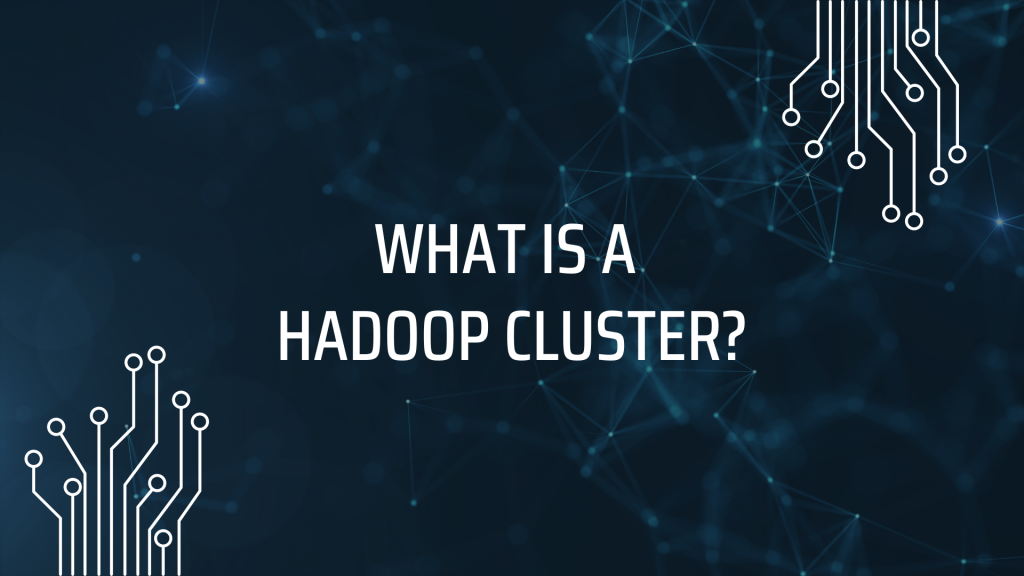Hadoop is an open-source platform for distributed data processing that handles huge amounts of data and storage for programmes running in a clustered setting.
It can manage structured, semi-structured, and unstructured data.
Compared to conventional relational database management systems (RDBMS), it offers customers more freedom for data collection, processing, and analysis.
Hadoop makes advanced analytics tools like predictive analytics, data mining, and machine learning available to big data experts.
It consists of the Hadoop YARN task scheduling and resource management framework and the Hadoop distributed file system (HDFS), which stores, manipulates, and distributes data across several nodes.
Definition of a Hadoop Cluster
Apache Hadoop is an open-source, Java-based software framework and parallel data processing engine.
It uses an algorithm (like the MapReduce method) and distributes the smaller tasks over a Hadoop cluster.
This makes it possible to break down large-scale analytics processing activities into smaller tasks that may be carried out concurrently.
A Hadoop cluster is a group of connected computers, or “nodes,” that carry out these kinds of parallel operations on massive amounts of data.
Contrary to traditional computer clusters, Hadoop clusters are designed to store and process enormous amounts of organized and unstructured data in a distributed computing environment.
Hadoop ecosystems differ from other computer clusters regarding their architecture and structure.
A Hadoop cluster is a network of interconnected master and slave nodes using low-cost, high-availability commodity hardware.
Because of its linear scaling capabilities and ability to add or remove nodes quickly in response to volume demands, it is well suited for big data analytics tasks with data sets that range in size.
Read: The Impact of the Internet of Things (IoT) on Our Lives and Work

Hadoop Cluster Architecture
Networks of master and worker nodes make up Hadoop clusters, which coordinate and carry out numerous tasks across the Hadoop distributed file system.
The name node, secondary name node, and job tracker are three components of the master nodes that often run on distinct pieces of higher-end hardware.
The workers, which are virtual machines running both the DataNode and TaskTracker services on common hardware, perform the actual work of storing and processing the jobs as instructed by the master nodes.
The Client Nodes, the last component of the system, are in charge of loading the data and obtaining the results.
Read: What Quantum Computing is and How it Will Change Everything
Components of a Hadoop Cluster
A Hadoop cluster has three components, which are discussed below:
Master Node
The master node in a Hadoop cluster is responsible for data storage in HDFS and parallel processing using MapReduce.
Master Node has 3 nodes – NameNode, Secondary NameNode and JobTracker.
While the NameNode manages the HDFS data storage task, JobTracker keeps track of the MapReduce-based parallel data processing.
NameNode keeps track of all the metadata about files, including the access time, the user accessing the file, and the file’s location in the Hadoop cluster.
The backup NameNode maintains the NameNode data.
Slave/Worker Node
This component in a Hadoop cluster is in charge of data storage and computation.
Each slave/worker node runs a TaskTracker and a DataNode service to connect with the master node in the cluster.
The TaskTracker service is subordinate to the JobTracker, while the DataNode service is subordinate to the NameNode.
Client Nodes
The client node is in charge of loading all the data into the Hadoop cluster because it has installed Hadoop and has all the necessary cluster configuration settings.
Client nodes submit MapReduce tasks that specify how data should be processed, and once the job processing is complete, the client nodes obtain the output.
Read: Differences between Big data and Hadoop
Hadoop Clusters Properties
Scalability
Hadoop clusters may easily scale up or down regarding the number of nodes, such as servers or generic hardware.
Let’s look at an illustration of what this scalable attribute entails.
Consider a scenario in which a company needs to analyse or maintain 5 PB of data over the next two months.
The company used 10 nodes (servers) in its Hadoop cluster to do this.
Put Your Tech Company on the Map!
Get featured on Nicholas Idoko’s Blog for just $50. Showcase your business, boost credibility, and reach a growing audience eager for tech solutions.
Publish NowHowever, since the company acquired additional data this month totalling 2 PB, it is now necessary to build up or increase his Hadoop cluster system’s server count from 10 to 12 (for the sake of argument).
Scalability is increasing or decreasing the number of servers in a Hadoop cluster.
Speed
Hadoop clusters are particularly effective at working at a very fast speed.
This is because the data is dispersed throughout the cluster and because of its data mapping capabilities, specifically its MapReduce architecture, which operates on the Master-Slave phenomenon.
Flexibility
One of the key characteristics of a Hadoop cluster is this.
According to this characteristic, the Hadoop cluster can manage any form of data, regardless of its type or structure.
This characteristic enables Hadoop to process data from online web platforms.
Economical
The distributed storage strategy used by Hadoop clusters, in which the data is dispersed among the cluster’s nodes, makes them extremely cost-effective.
To increase storage, we would only need to install one more piece of inexpensive hardware storage.
No Data-loss
A Hadoop cluster can replicate the data on another node, so there is zero probability that any node will experience data loss.
Even if a node fails, no data is lost because a backup copy of that data is kept on file.
Read: What is Big Data Analytics and Why is it Important?

Types of Hadoop Clusters
1. Single Node Hadoop Cluster
As the name suggests, a single node makes up a single cluster in a Hadoop setup.
This means that all of our Hadoop daemons, including the Name Node, Data Node, Secondary Name Node, Resource Manager, and Node Manager, will run on the same system or machine.
Additionally, a single JVM (Java Virtual Machine) Process Instance will manage all of our processes.
2. Multiple Node Hadoop Cluster
Hadoop clusters with multiple nodes have several nodes, as the name implies.
All of our Hadoop Daemons will be stored in this type of cluster configuration on various nodes throughout the cluster.
In a multi-node Hadoop cluster setup, we often aim to use our faster processing nodes for the Master, such as the Name node and Resource Manager, and we use the more affordable system for the slave Daemons, such as Node Manager and Data Node.
Conclusion
In conclusion, Hadoop clusters are essential for efficiently managing and processing massive amounts of structured and unstructured data.
Their distributed architecture ensures scalability, speed, and cost-effectiveness, making them a powerful tool for big data analytics.
By leveraging the master-slave framework, Hadoop clusters can handle diverse data types, ensuring flexibility and preventing data loss.
Whether using a single-node setup for simplicity or a multi-node configuration for larger tasks, Hadoop clusters provide a reliable solution for modern data challenges.
This enables businesses to harness the full potential of their data.
Before You Go…
Hey, thank you for reading this blog post to the end. I hope it was helpful. Let me tell you a little bit about Nicholas Idoko Technologies.
We help businesses and companies build an online presence by developing web, mobile, desktop, and blockchain applications.
We also help aspiring software developers and programmers learn the skills they need to have a successful career.
Take your first step to becoming a programming expert by joining our Learn To Code academy today!
Be sure to contact us if you need more information or have any questions! We are readily available.
[E-Books for Sale]
1,500 AI Applications for Next-Level Growth: Unleash the Potential for Wealth and Innovation
$5.38 • 1,500 AI Applications • 228 pages
Are you ready to tap into the power of Artificial Intelligence without the tech jargon and endless guesswork? This definitive e-book unlocks 1,500 real-world AI strategies that can help you.
See All 1,500 AI Applications of this E-Book
750 Lucrative Business Ideas: Your Ultimate Guide to Thriving in the U.S. Market
$49 • 750 Business Ideas • 109 pages
Put Your Tech Company on the Map!
Get featured on Nicholas Idoko’s Blog for just $50. Showcase your business, boost credibility, and reach a growing audience eager for tech solutions.
Publish NowUnlock 750 profitable business ideas to transform your future. Discover the ultimate guide for aspiring entrepreneurs today!
See All 750 Business Ideas of this E-Book
500 Cutting-Edge Tech Startup Ideas for 2024 & 2025: Innovate, Create, Dominate
$19.99 • 500 Tech Startup Ideas • 62 pages
You will get inspired with 500 innovative tech startup ideas for 2024 and 2025, complete with concise descriptions to help you kickstart your entrepreneurial journey in AI, Blockchain, IoT, Fintech, and AR/VR.
We Design & Develop Websites, Android & iOS Apps
Looking to transform your digital presence? We specialize in creating stunning websites and powerful mobile apps for Android and iOS. Let us bring your vision to life with innovative, tailored solutions!
Get Started Today



